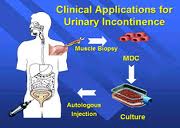About 30% of people over 60 suffer from urinary stress incontinence, a frustrating and embarrassing condition. It tends to occur, when the sphincter muscles that open and close the urethra become weak and diminished or when the urethra becomes narrowed. Urine leakage will occur, if a person coughs, sneezes, lifts heavy objects, exercises or laughs. For the patient it is no laughing matter, and neither surgery nor incontinence pads have proven to be the solution to the problem. Medication has been available, however with any medication, side effects remain a reality.
According to new research from The University of Innsbruck, Austria, a revolutionary treatment for stress incontinence has been developed. Dr. Ferdinand Frauscher presented findings at a meeting of the Radiological Society of North America in Chicago, which look very promising. The treatment involves the removal of stem cells from a patient’s arm, which are cultured for six weeks and then injected into the sphincter muscle and the wall of the urethra. To achieve this stem cell therapy a special three-dimensional transurethral ultrasound had to be developed, so researchers could see exactly where the new cells had to be placed. The therapy is minimally invasive and can be done under local anesthesia. The initial study involved 20 women with minor to severe stress incontinence. Many reported an improvement after only one day, and 18 remained continent one year after injection. Ultrasound findings showed a significant increase in the thickness of the urethra and the sphincter muscle.
The muscle also showed an improvement in contractibility. The cost of the procedure was comparable to other popular incontinence treatments, such as collagen injections and the long-term purchase of adult diapers.
At this point it is not known, when this treatment will become widely available in North America.
References: The Medical Post, January 4,2005, page 18
Last edited December 7, 2012






